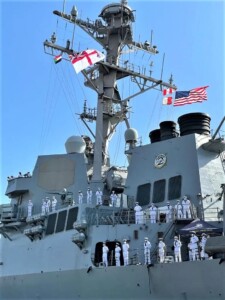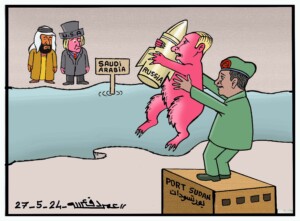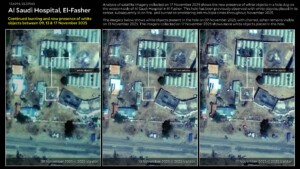Sudan’s Transitional Partners Council explained by Hafiz Ismail
Since Chairman of Sudan’s Sovereign Council, Lt Gen Abdelfattah El Burhan, issued a decree to form the Transitional Partners Council (TPC) on December 1, it has been subject of many discussions and critiques. In an interview with Radio Dabanga on Saturday, Hafiz Ismail explains the origins of the TPC and the reasons for the controversy.
 El Burhan with list with members of the Partners Council (Teiba Satellite TV news)
El Burhan with list with members of the Partners Council (Teiba Satellite TV news)
Since Chairman of Sudan's Sovereign Council, Lt Gen Abdelfattah El Burhan, issued a decree to form the Transitional Partners Council (TPC) on December 1, it has been subject of many discussions and critiques. In an interview with Radio Dabanga on Saturday, Hafiz Ismail explains the origins of the TPC and the reasons for the controversy.
On December 1, the chairman of Sudan's Sovereign Council, Lt Gen Abdelfattah El Burhan, issued a decree to form a Transitional Partners Council (TPC).
The TPC will have 29 members, six from the military, the prime minister, 13 from the Forces for Freedom and Change, and nine members of the Sudan Revolutionary Front (SRF) rebel alliance that signed the Juba Peace Agreement with the government on October 3. El Burhan will chair the new council as well.
The decision was not immediately announced, but leaked to the press three days later. The move received widespread criticism from the start. Especially the allocation of a sixth military seat caused widespread critique.
The five current military members of the Sovereign Council will have a seat in the TPC, but a sixth military seat has been reserved for Abdelrahim Hamdan Dagalo, Deputy Commander of the notorious paramilitary Rapid Support Forces (RSF) and brother of Mohamed Hamdan ‘Hemeti’, RSF Commander-in-chief and Vice President of the Sovereign Council.
Criticism
The plans received widespread criticism from all kinds of political parties and civil society organisations who accused El Burhan of abusing his authority to transfer political power away from the country's constitutional institutions to the TPC.
The Sudanese Professionals Association (SPA), a driving force behind the revolution and initiator of the Forces for Freedom and Change (FFC), refused “the so-called TPC in both form and content” in press statement on December 4. It called the move “contrary to the spirit of the December revolution and the goals of the transitional period”.
Sovereign Council member Aisha Mousa described the decision as a “violation of the Constitutional Document”. It is “a clear transgression of proper democratic practice,” she stated in a letter addressed to PM Abdallah Hamdok.
Agreements and confusion
As became clear in some of the reactions, a number of opponents does not seem to realise that the formation of a TPC was agreed on by the Sudanese government and the SRF during the peace talks.
Hafiz Ismail, economist and political analyst, explained in an interview with Radio Dabanga on Saturday that the idea of a partners council has its roots in the Juba peace talks between the government and the rebel movements.
“I think the idea of establishing this council came from the leaders of the rebel movements. It definitely serves the interest of the military,” he said.
The contents of the Juba Peace agreement were added to the August 2019 Constitutional Document. The new article 80 in the amended Constitutional Document stipulates the formation of a new council “with a very vague role, broader than the current Sovereign Council”.
Weakening civilian governance
According to this document, the chairman of the Partners Council will issue a set of rules on its formation and eventual role, a formulation that can be subject to many interpretations.
As El Burhan is set to be the chairman of both the Sovereign Council and the TPC, “the new council will consolidate the power of the military members of the Sovereign Council and some of the rebel signatories to the Juba Peace Agreement,” Ismail states. “It is clear that will hinder any genuine process of democratisation.”
He explained that “PM Abdallah Hamdok is not happy about the way this council is formed, in part because the TPC will have a veto over the executive branch of the government,” of which Hamdok is the leader. Therefore, “such an alliance between the military and leaders of the rebel movements will definitely weaken the civilian side of the government.”
Ismail added that most member groups of the FFC (set-up in response to the Declaration of Freedom and Change) are not happy about the formation of the Partners Council and that “some are mobilising their supporters against the decision”.
Marches are planned on December 19 in commemoration of the start of the December revolution in 2018 that led to the ousting of President Al Bashir and part of the protests will be directed against the formation of the TPC, Ismail said. “The Sudanese people insist on a civilian government".
Since the ousting of the Al Bashir regime, their main slogans have been “Freedom, Peace, Justice”, and “Civilian! [madaniya!]” in demand of civilian governance.
Questions of power attribution
Ismail explained that, according to the amended Constitutional Document, the Partners Council is supposed to function as an adjudicator in case of any dispute or disagreement concerning the interpretation of the terms of the Juba Peace Agreement. Its original role thus was that of an independent mediator in case of conflict.
“The Partners Council is not be supposed to take over the role of the Sovereign Council but [according to El Burhan’s current plans] it seems that it will have more power,” the analyst stated.
Its effective power will depend on the terms of reference “but it is expected that a conflict with the Council of Ministers over its exact mandate, and over the establishment of the Legislative Council, will occur in the near future.”
The formation of this Legislative Council has been postponed multiple times, the last time to December 31 this year.
“The formation is long overdue”, Ismail states. “We still do not know when it is exactly going to happen”. At the moment, there are many forces benefiting from the absence of a parliament. “According to the Juba Peace Agreement’s Implementation Matrix, it should have been established by now, but there is a delay in the implementation of all terms of the agreement.”
As for the SPA, the first group to denounce the new TPC and that called for mass protests, Ismail commented by saying that “the SPA itself is split”. One wing published the statement against the Partners Council as it is currently presented, while the other wing will actually hold a seat in the presented TPC with Mohamed Naji El Asam, who presented the original Declaration of Freedom and Change.
Financial difficulties
Another problem is the fact that the Sudanese government does not have the resources to honour its financial commitments to the Juba Peace Agreement. Last month, PM Hamdok acknowledged that the implementation of the peace agreement faces serious financial challenges.
In comparison with the 2005 Comprehensive Peace Agreement (CPA), the 2006 Darfur Peace Agreement (DPA), and the 2011 Doha Document for Peace in Darfur (DDPD), not much political and financial support is offered yet by the international and regional communities.
“The delay in peace talks with two key armed movements is one of the reasons for not getting the needed financial and political support,” Ismail said.
Things may change again when peace deals are reached with the holdout rebel movements, the Sudan People Liberation Movement-North headed by Abdelaziz El Hilu (SPLM-N El Hilu) in South Kordofan and parts of Blue Nile state and the Sudan Liberation Movement under the leadership of Abdelwahid El Nur (SLM-AW). They are still to negotiate their demands with the Sudanese government.
“Peace accords with these two movements are expected to be reached in the near future and will not only open the doors for major changes to the Juba Peace Agreement, but also for the possibility of receiving the needed financial and political support,” the Sudanese analyst concluded.

Hafiz Ismail
Former banker, economist, political analysis, and civil society activist Hafiz Ismail is a leading member of the Sudanese panel of experts, many of whom have lived in exile since 1989. He has been interviewed by Radio Dabanga on multiple occasions. He is also head of the civil society organisation Justice Africa Sudan,











 and then
and then